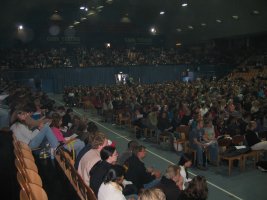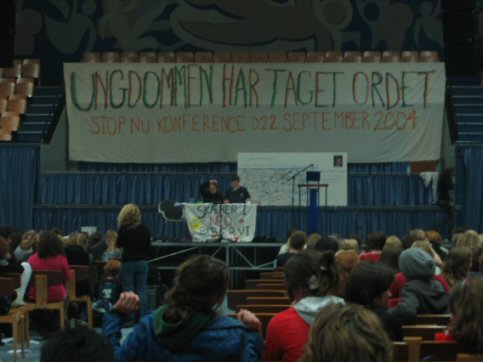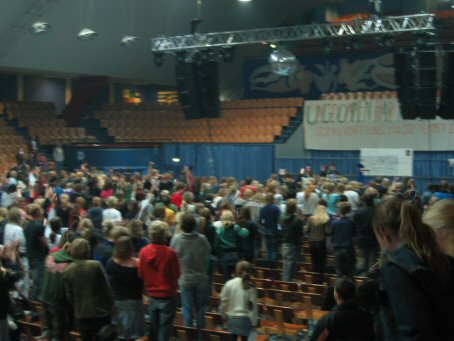 |
Last Wednesday, September 22, became an historic day for the Danish student movement. Nearly 2500 young people from almost all types of educational institutions and from all over the country gathered in the KB hall to start the “STOP-NOW”-initiative, which has been called by most of the traditional student organizations. They gathered because the government, in spite of the obvious bad state of the education system, continues to carry through cutbacks. The initiative will lead the joint struggle for better education, uniting all young people, across all types of education, and in this context, put forward a number of political demands for the improvement of the conditions of pupils, students and apprentices. Moreover, it was decided to set up regional “STOP-NOW” networks and to mobilize for a joint day of struggle, on October 5.
“The youth have seized the floor!” a big banner read behind the scene, and it also reflected the enthusiastic mood from the very beginning of the conference, when Thor Möger Pedersen, chairmen of DGS (the traditional secondary-school student organization), held an opening speech which further lifted the mood in the hall.
As was pointed out many times from the floor of the conference, education can be considered as one of Denmark’s raw materials, it is a securing of society’s future.
But it is not just for this reason that pupils, students and apprentices are uniting at this stage. They have struggled before, but the point is that the cutbacks have continued, which has resulted in them facing the same problems as before – the same or worse conditions, while more cutbacks are on the agenda in the future.
The working environment in the education system has become worse, everywhere the furniture and classrooms are too small or too old and worn. For example, at Stenhus Gymnasium in Holbæk, 60% of the school is full of mold fungus. The fact that the government is neglecting the working environment and especially the physical conditions is reprehensible, especially when one considers the fact that a new reform of the secondary schools, which is supposed to “modernize” the schools, will be introduced this August.
 |
Another tendency in the school system across all types of education is the straitened circumstances of student democracy. The external governing bodies continue at the university, and this means that people outside the university – i.e. big business – have the majority on the board. Now the secondary schools will be ‘independent’, self-governing institutions. Freehold of these schools opens the way for user’s fees and external boards, as seen in the universities, that means cutbacks directed against the economically weakest people and less democracy, which favors big business.
All this clearly shows that the government is not just neglecting the youth, but that they are deliberately hostile to the idea of education for everyone and in favor of an educational system that fits the business community.
The second speaker at the conference, Per Schultz Jørgensen from the Pedagogical University of Denmark talked of an exaggerated focus on the measuring of effectiveness and individuality as a standard solution, and he thought that the policies of the government were a conscious liberalization of education, which all in all resulted in a negative social heritage, where there is not room for everyone to get the education they want. Judging from the noise level and the applause after his speech, it seemed that the audience agreed. After such good lead-offs the scene was set for a good debate in the following workshops.
All the cutbacks, which have already been carried through, and the prospect of more to come have naturally united the pupils, students and apprentices in the “STOP-NOW” initiative. United we are stronger, the idea is, and one must therefore also assume that this is a permanent campaign that will not cease before the educational policies are completely reversed.
But the question is whether the line adopted by the conference really is capable of winning concessions. As already said, the conference decided to call and mobilize massively for a joint national day of action, on October 5, the opening day of parliament. It is an absolutely correct decision, because mass demonstrations are an important way for students, pupils and apprentices to show that they stand united behind their demands.
Speaker after speaker clearly expressed the discontent and the will to struggle amongst pupils, students and apprentices – the most rousing speeches always answered by loud applauses from the audience. When the chairmen of DGS in the end quoted the radio news talking of a new youth rebellion, the crowd broke into standing ovation. But in spite of the high expectations and intentions, we left the conference without any concrete plan for what to do after October 5, and the risk of the activities petering out thereafter is indeed present.
As the demands of the “STOP-NOW” initiative basically are about the idea of a free education for everyone, a fundamental principle in the Danish welfare society, and therefore a policy not supported by the government, it strikes one that the initiative thinks that it can win the demands only through demonstrations, various happenings and attention from the media.
The joint demands approved at the conference are about a good and free education for everyone and must therefore be linked to the struggle for welfare in general, because the struggle for welfare is not a different struggle. It is a struggle for ordinary peoples’ everyday living and opportunities, including the pupils, students and apprentices.
On that basis, collaboration and an alliance with the trade union movement is necessary. Financial backing from the trade union movement is not enough. We know from previous struggles that the government will not always listen simply because of one day of action or a big demonstration in front of parliament, but that they need to be forced. If the demands of “STOP-NOW” are to be carried through and secure that education is not neglected again, it would imply a complete change of policies on the part of the government. And in reality it would imply that they neglect the interests of their backers – that is those of big business.
 |
That is why demonstrations and regional networks, although they are good and necessary things, unfortunately are not enough in themselves to win serious concessions. Only if massive pressure is exercised on the government is it possible to win some concessions on the demands. If big business is pressured by workers’ strikes, the picture would be a lot different. Then it would be possible that the government would retreat, give concessions and comply with some of the demands of the “STOP-NOW”-initiative. It is impossible to win the demands by “moralizing” or simply negotiating with the government or big business. It can only be done by pressure – by economic pressure. That is why the STOP-NOW initiative needs the trade union movement, because it is capable of putting force behind its words. Yes, pupils, students and apprentices have already gained strength by uniting in this initiative, but if the movement is to advance, it must be conscious of the necessity of an alliance with the trade union movement and in the last analysis it must be conscious of the need for a new government with new policies.
The fact that the conference was so big, was well over all expectations, Christina Celeste, chairmen of EEO, the apprentices organization, said in her speech. The STOP-NOW initiative is now working towards the day of action, on October 5, and judging from the atmosphere that surrounded the conference, the scene is set for an active struggle for better conditions in the schools and for education for everyone. And the struggle is important, because as Per Schultz Jørgensen said, the STOP-NOW initiative also sends a signal – a signal to the rest of Danish society, that the debate and the struggle for a better society is on the agenda. A struggle for the everyday life of working people. A struggle that STOP-NOW must be a part of.
